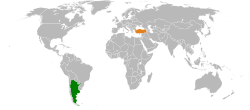
Foreign relations between Argentina and Turkey, have existed for over a century. Argentina has an embassy in Ankara and Turkey has an embassy in Buenos Aires. Turkey's staunch support for fellow NATO member United Kingdom during the Falklands War and the recognition of the Armenian genocide by the Argentine parliament have soured relations between the two countries.
History and diplomatic incidents

The relations between Turkey and Argentina go back to the signing of the protocol of consular affairs between the Ottoman Empire and Argentina in 1910.
Following the promulgation of the Republic of Turkey, Friendship Agreement was signed in Rome in 1926.
In 1992, President of Argentina Carlos Menem visited Turkey. President of Turkey Süleyman Demirel visited Argentina in 1995. In 1998, İsmail Cem was the first Foreign Minister of Turkey who visited Argentina.
Economic links
Turkey and Argentina have signed an Economic and Commercial Cooperation Agreement. The trade volume between the two countries was approximately US$455 million, with Turkey exporting US$161 million and importing US$294 million from Argentina by the end of 2019.[1]
Flights from Istanbul to Buenos Aires via São Paulo commenced in December 2013 and are taking place on a daily basis.
In recent years, millions of dollars worth of Turkish TV series have been exported to Argentina.
Nuclear cooperation
On 3 May 1988, Argentina and Turkey signed a 15-year nuclear cooperation agreement, following Turkey's drive for nuclear fuel cycle independence. Argentina agreed to study the feasibility of building a 300 MWe PWR designed by Empresa Nuclear Argentina de Centrales.[2] Other fuel cycle activities were also explored.[3]
In October 1990, Turkish companies Sezai Turkes-Fevzi Akkaya and TEK formed a joint engineering agreement with Argentine agencies Comisión Nacional de Energía Atómica and Investigaciones Aplicadas to develop two CAREM-25 nuclear reactors, one in each country, with construction to begin in 1991 in Argentina and in 1992 in Turkey.[2] Former Turkish Prime Minister Turgut Ozal and Argentine President Carlos Menem personally negotiated the deal. However, the arrangement was cancelled a year later due to international pressure because of proliferation concerns.[2][3]
Visits
| Guest | Host | Place of visit | Date of visit |
|---|---|---|---|
| Çankaya Köşkü, Ankara | May 8-11, 1992 | ||
| Casa Rosada, Buenos Aires | April, 1995 | ||
| Ankara and Istanbul | January 20–21, 2011 | ||
| 2018 G20 Buenos Aires summit, Buenos Aires | November, 2018 |
See also
References
- ^ "Relations between Turkey and Argentina". Republic of Turkey Ministry of Foreign Affairs. April 1, 2020. Retrieved 2020-01-04.
- ^ a b c "The CANDU Syndrome: Canada's Bid to Export Nuclear Reactors to Turkey". Campaign for Nuclear Phaseout. September 1997. Retrieved 2009-08-13.
- ^ a b Kibaroglu, Mustafa. "TURKEY'S QUEST FOR PEACEFUL NUCLEAR POWER" (PDF). James Martin Center for Nonproliferation Studies: The Non-Proliferation Review (Spring-Summer 1997). pp. 37–38. Retrieved 2009-08-13.


